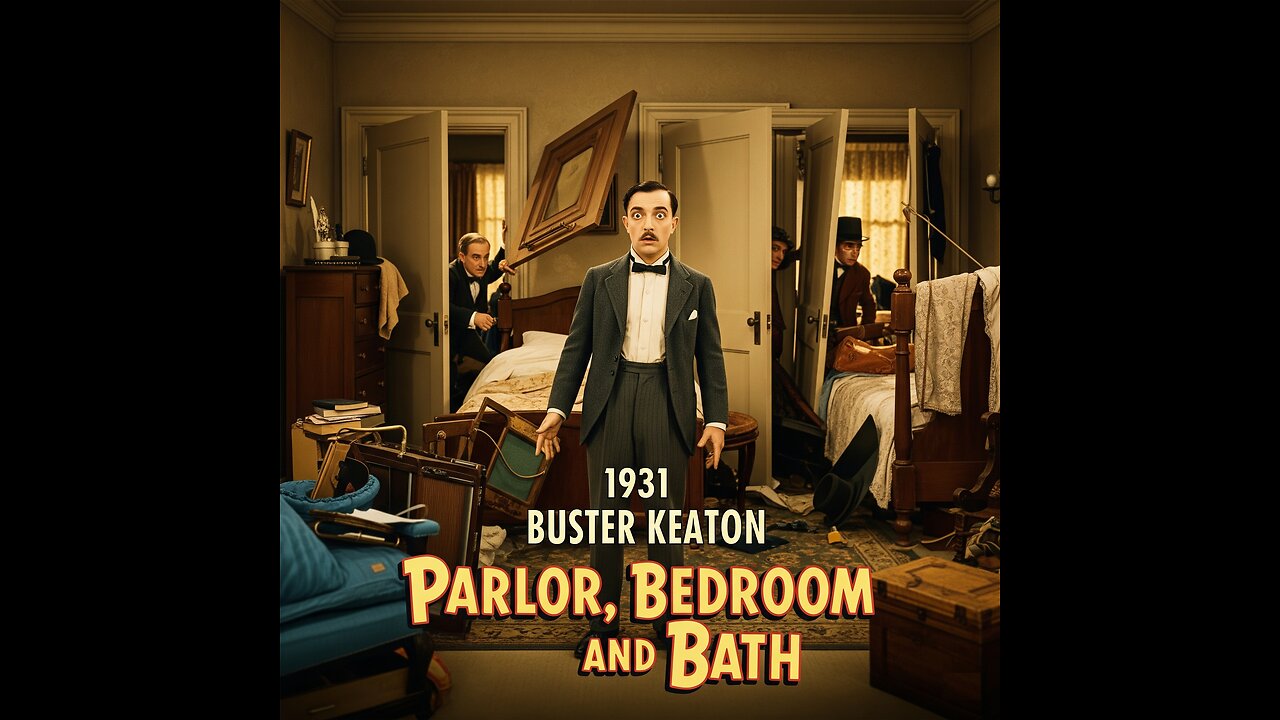Premium Only Content

1931 Parlor Bedroom and Bath (B. Keaton)
"Parlor, Bedroom and Bath" is a 1931 American pre-Code comedy film. It's most notable for starring Buster Keaton, one of the greatest silent film comedians, in a sound-era role. The film is a remake of a 1920 silent film of the same name and is based on a popular 1917 Broadway farce.
Here's a description of the movie:
Title: Parlor, Bedroom and Bath
Release Year: 1931
Genre: Comedy, Farce, Screwball Comedy (early elements), Pre-Code
Director: Edward Sedgwick
Screenplay by: Robert E. Hopkins, Arthur Freed (based on the play by Charles W. Bell and Mark Swan)
Production Company: Metro-Goldwyn-Mayer (MGM)
Starring: Buster Keaton, Charlotte Greenwood, Reginald Denny
Plot:
The film is a classic bedroom farce, filled with mistaken identities, chaotic misunderstandings, and door-slamming comedy. The central character is Reginald "Reggie" Irving (played by Buster Keaton), a shy, timid, and awkward bachelor. He's hopelessly in love with Virginia Embrey (Dorothy Christy), but he's too bashful to confess his feelings or propose marriage.
Virginia's older sister, Angelica (Charlotte Greenwood), a strong-willed and rather domineering woman, decides to "help" Reggie overcome his shyness. Her unconventional plan involves setting Reggie up with a reputation as a notorious ladies' man and heartbreaker. The idea is that if other women find him irresistible, Virginia will also be impressed and attracted to him.
Angelica orchestrates a series of elaborate schemes, inviting various "flames" (often women of questionable reputation or who are simply part of the misunderstanding) to her home, all with the intention of making Reggie appear to be a irresistible Don Juan. This leads to a cascade of comedic complications:
Mistaken Identities: People are constantly confused about who is who and who is romantically involved with whom.
Hidden Lovers: Characters hide in closets, under beds, and behind furniture to avoid being discovered.
Slamming Doors: A hallmark of farce, with characters narrowly missing each other as they enter and exit rooms.
Exaggerated Reactions: Reggie, being naturally timid, is overwhelmed by the chaos, leading to classic Buster Keaton-esque bewildered reactions.
The film's humor comes from the escalating absurdity of the situations, the rapid-fire dialogue (a challenge for Keaton, who was a master of visual comedy), and the delightful awkwardness of Reggie as he tries to navigate the ridiculous charade.
Significance:
"Parlor, Bedroom and Bath" is significant primarily as one of Buster Keaton's early sound films for MGM. While Keaton's unique brand of deadpan physical comedy from the silent era didn't always translate perfectly to the sound format (and MGM's studio system often constrained his creative control), this film allowed him to showcase his talent for playing the sympathetic, put-upon everyman caught in hilarious circumstances. It's a prime example of the kind of theatrical farce that was popular in early sound cinema, where dialogue and intricate plot misunderstandings took center stage. For Keaton fans, it's an interesting watch to see him working within a different comedic style than his iconic silent era work.
-
 LIVE
LIVE
vivafrei
1 hour agoKash Patel's Girlfriend Sues Elijah Schaeffer for $5 MIL Man Charged Over Portnoy Incident & MORE!
10,088 watching -
 LIVE
LIVE
The Quartering
2 hours agoWar Declared On ICE In Chicago, Massive Allegations Against Leftist Streamer Hasan, 600,000 Chinese
5,179 watching -
 2:04:04
2:04:04
DeVory Darkins
3 hours agoSchumer gets NIGHTMARE NEWS from Democrats
113K34 -
 2:10:12
2:10:12
Side Scrollers Podcast
4 hours agoMAJOR Hasan Allegations + Arc Raiders Review CONTROVERSY + Craig TRENDS on X + More | Side Scrollers
23.4K6 -
 5:43
5:43
Buddy Brown
4 hours ago $2.05 earnedThere's a List of WEF's "Post Trump" Predictions GOING VIRAL! | Buddy Brown
11.5K12 -
 1:02:24
1:02:24
Timcast
4 hours agoBerkeley Goes BALLISTIC Over TPUSA Event, Massive BRAWL ERUPTS
161K122 -
 LIVE
LIVE
StoneMountain64
2 hours agoBattlefield REDSEC $100k TOURNAMENT
146 watching -
 57:04
57:04
Daniel Davis Deep Dive
7 hours agoRussia's Doomsday Weapon /MIT Prof. Ted Postol
15.2K2 -
 2:12:10
2:12:10
Steven Crowder
6 hours ago🔴Is This Really MAGA: What the Hell Is Donald Trump Doing?
464K521 -
 1:03:36
1:03:36
The Rubin Report
4 hours agoCNN Panel Looks Angry as Republican Points Out How Dems Shutdown Backfired
50.8K52